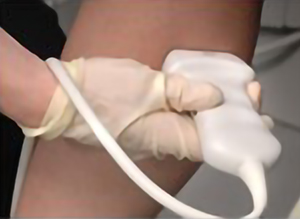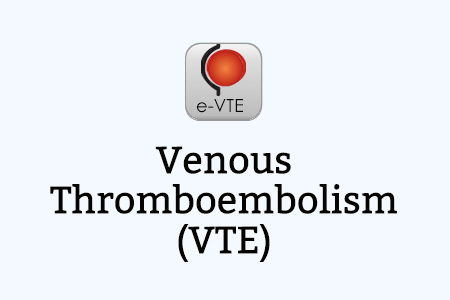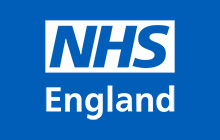About the Venous Thromboembolism programme
Venous Thromboembolism (VTE) is a significant cause of mortality, long-term disability and chronic ill-health problems – many of which are avoidable. 1 in 20 people will have a VTE at some time in their life and the risk increases with age. It is estimated that as many as half of all cases of VTE are associated with hospitalisation for medical illness or surgery. VTE is an international patient safety issue and its prevention has been recognised as a clinical priority for the NHS in England.

Knowing the signs & symptoms of VTE can save lives
This video tells the story of former England International Goalkeeper Paul Robinson who developed a pulmonary embolism 5 days after having being admitted to hospital for a routine operation.
VTE prevention elearning course
These resources have been developed in partnership with the NHS England National VTE Prevention Programme. The elearning session for healthcare professionals in Secondary Care first published in 2010 and updated in 2013 and 2019 is aimed at nurses, pharmacists and junior doctors to help them understand the concept of hospital-associated thrombosis and how to prevent it.
Three new sessions were developed in 2014 and updated in 2019.
The first is aimed at Primary Care to increase the awareness of healthcare-related VTE and enhance the quality of patient care with respect to VTE prevention prior to hospital admission and after discharge. It is designed for all healthcare professionals including GPs, nurses, health visitors, midwives and community pharmacists.
The second session has been developed for commissioners. This elearning session provides a brief overview of venous thromboembolism as a condition and outlines the key role that commissioners have to play in ensuring that the delivery of acute care services across a range of medical & surgical specialties is underpinned by a high quality approach to VTE prevention in order to improve outcomes for patients.
The third elearning session is aimed at undergraduates and is focused on the pathophysiology of VTE and pre-disposing risk factors, as well as outlining why prevention is so important in the context of the national programme.
Executive group

Alan Ryan
National Programme Director, HEE elearning for healthcare
Professor Roopen Arya
Professor of Thrombosis & Haemostasis, King’s College Hospital NHS Foundation Trust, Director King’s Thrombosis Centre & Clinical Lead for the National VTE Prevention Programme
Helen Morrison
National VTE Prevention Programme Manager, NHS England
Project team

Professor Roopen Arya
Professor of Thrombosis & Haemostasis, King’s College Hospital NHS Foundation Trust, Director King’s Thrombosis Centre & Clinical Lead for the National VTE Prevention Programme
Dr Lara Roberts
Consultant Haematologist, King’s College Hospital NHS Foundation Trust
Dr Jignesh Patel
Senior Clinical Lecturer in Clinical Pharmacy Practice & Honorary Consultant Pharmacist in Anticoagulation, King’s College Hospital NHS Foundation Trust
Dr Julia Czuprynska
Consultant Haematologist, King’s College Hospital NHS Foundation Trust
Mark Millar
Project Manager, HEE elearning for healthcare
How to access
Available to all
The Venous Thromboembolism programme is freely available to access here.
Please note your progress and completion of sessions will not be recorded and you will not be able to generate a record of completion. If you require evidence of learning, please register and then log in to access this programme on the elfh Hub.
To view the Venous Thromboembolism programme, select the View button below. If you already have an account with elfh, you will also be able to login and enrol on the programme from the View button.
NHS healthcare staff in England
The Venous Thromboembolism programme is also available to NHS healthcare staff via the Electronic Staff Record (ESR). Accessing this elearning via ESR means that your completions will transfer with you throughout your NHS career.
Further details are available here.
Not an NHS organisation?
If you are not an NHS health or care organisation and therefore do not qualify for free access elfh Hub, you may be able to access the service by creating an OpenAthens account.
To check whether or not you qualify for free access via OpenAthens, you can view the eligibility criteria and register on the ‘OpenAthens’ portal.
Registering large numbers of users
If you are a HR, IT or Practice Manager and would like to register and enrol large numbers of staff within your organisation for access onto the Venous Thromboembolism programme, please contact elfh directly.
Organisations wishing to use their own LMS
For HR departments wanting to know more about gaining access to courses using an existing Learning Management System please contact elfh directly to express interest.
More information
Please select the following link for more information on how to use the elfh Hub.




